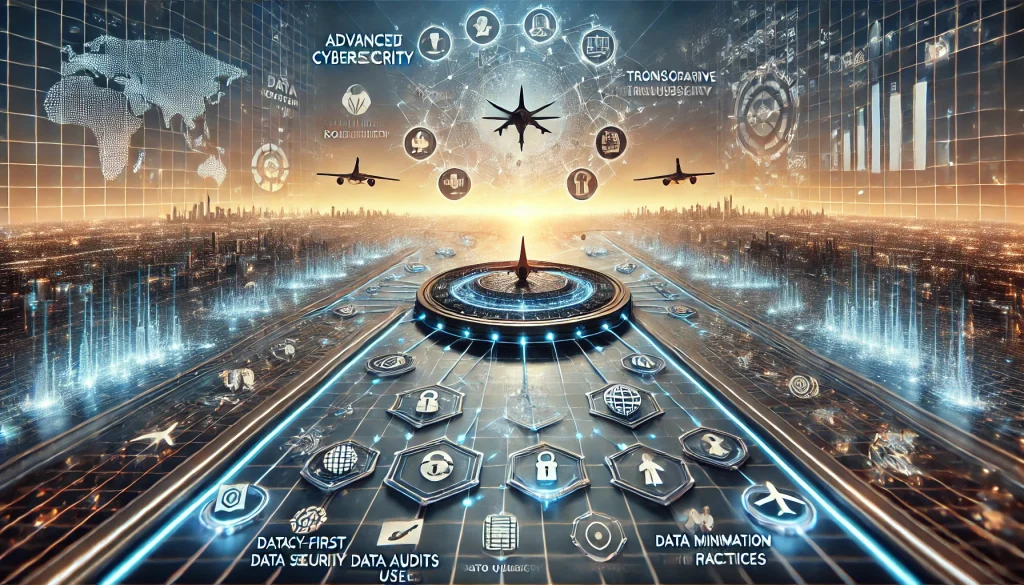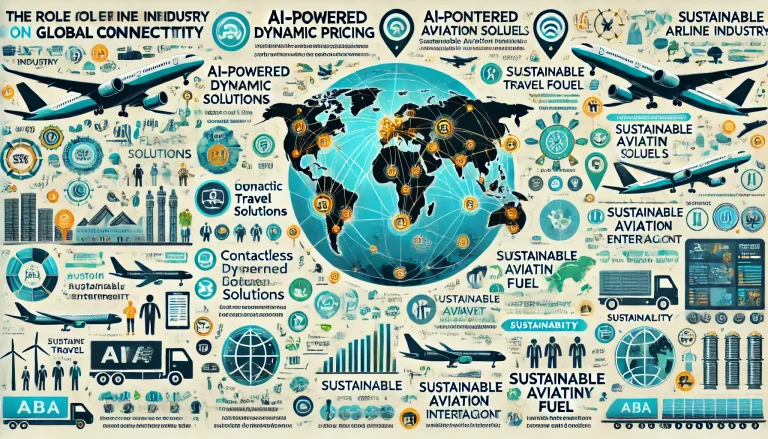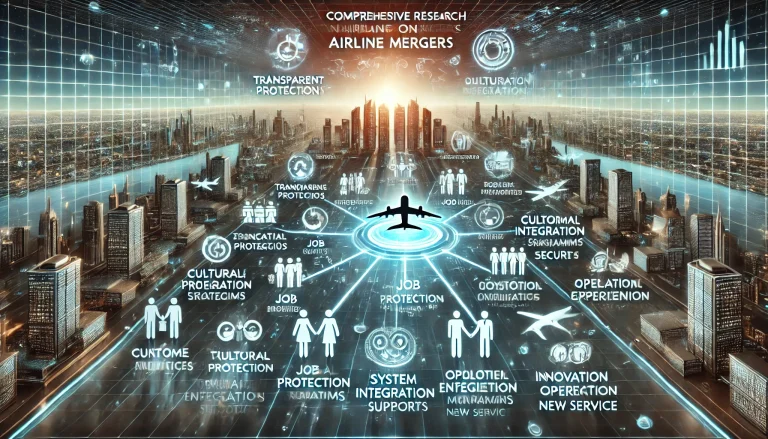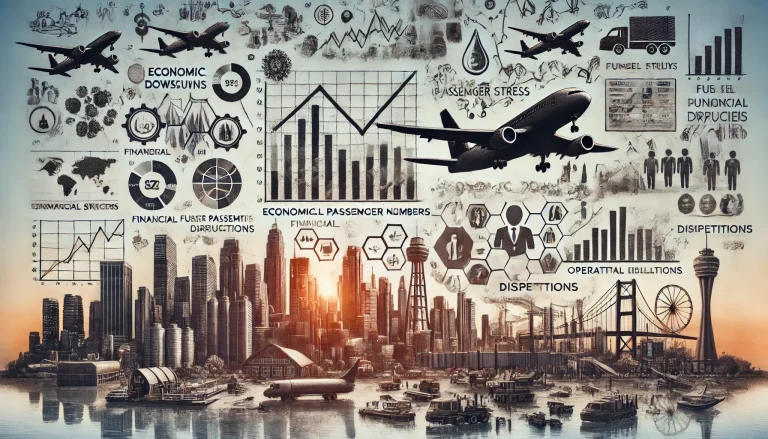Problem Statement
As airlines increasingly leverage passenger data to enhance personalization, improve operational efficiency, and offer tailored services, they face a growing challenge: ensuring data privacy and cybersecurity. With the vast amounts of data collected—from personal details and travel history to payment information and preferences—the potential for data breaches has become a significant concern. These breaches can have serious consequences, including the erosion of customer trust, legal repercussions, and substantial financial penalties.
The aviation industry relies on this data to offer a seamless travel experience, from personalized offers and loyalty programs to efficient check-in and boarding processes. However, the more data airlines collect and store, the greater the risk of that data being compromised. Hackers may target airlines to steal sensitive information, leading to identity theft, financial fraud, or the unauthorized sale of personal data on the dark web.
Moreover, as regulatory frameworks like the General Data Protection Regulation (GDPR) in Europe and the California Consumer Privacy Act (CCPA) in the United States become more stringent, airlines must ensure they are fully compliant with data protection laws. Failure to do so can result in hefty fines and damage to the airline’s reputation.
Balancing the benefits of data usage with robust cybersecurity measures and respect for passenger privacy is essential for airlines to maintain customer trust and comply with legal requirements. This involves implementing advanced cybersecurity protocols, regular data audits, and encryption techniques to protect sensitive information. Airlines must also be transparent with passengers about how their data is used and offer them control over their personal information.
Addressing these challenges requires a comprehensive approach that combines technological innovation, regulatory compliance, and a strong commitment to data privacy. By doing so, airlines can continue to harness the power of data to enhance the passenger experience while safeguarding against the risks of data breaches and cyber threats.
Pain Points
- Data Breaches: The risk of sensitive passenger data being compromised by cyberattacks, leading to identity theft and financial fraud.
- Customer Trust Erosion: Potential loss of customer trust due to concerns about data privacy and the misuse of personal information.
- Regulatory Compliance: The need to adhere to stringent data protection laws like GDPR and CCPA, with significant penalties for non-compliance.
- Cybersecurity Threats: Increasing sophistication of cyberattacks targeting airline data systems.
- Data Management Complexity: Challenges in managing and securing large volumes of passenger data across multiple systems and platforms.
- Transparency Issues: The importance of being transparent with passengers about how their data is used and ensuring they have control over it.
- Financial Penalties: The risk of substantial fines and legal costs resulting from data breaches or non-compliance with data protection regulations.
- Operational Disruption: Potential disruptions to airline operations due to cyber incidents or data breaches.
- Reputation Damage: The long-term impact on an airline’s reputation following a data breach or cybersecurity failure.
- Balancing Data Use and Privacy: The challenge of maximizing the benefits of data utilization while respecting passenger privacy and maintaining robust security measures.
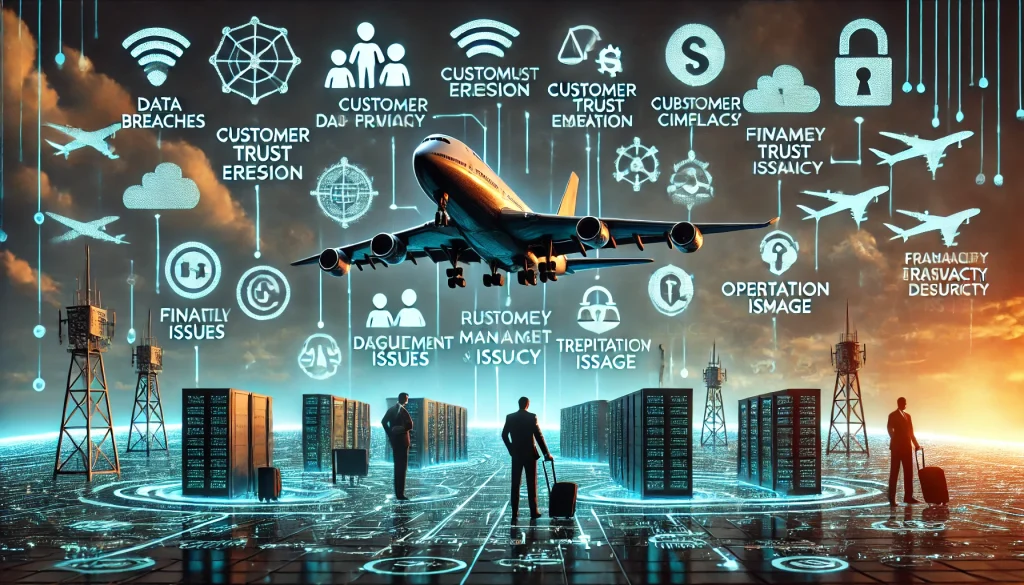
Future Vision
Our platform envisions a future where airlines can effectively balance the benefits of data utilization with stringent cybersecurity measures and respect for passenger privacy. To achieve this, the platform will support the implementation of advanced cybersecurity technologies, such as encryption, multi-factor authentication, and real-time threat detection systems. These measures will help protect sensitive passenger data from unauthorized access and cyberattacks.
Airlines will also need to adopt a proactive approach to data privacy, conducting regular data audits and ensuring compliance with global data protection regulations. This will involve working closely with legal and compliance teams to stay updated on the latest regulatory requirements and implementing best practices for data management.
Transparency will be key to maintaining customer trust. Airlines must communicate clearly with passengers about how their data is collected, stored, and used. This could include providing easy-to-understand privacy policies, offering passengers the ability to control their data preferences, and ensuring that data usage is always aligned with customer consent.
To further enhance data security, airlines can leverage emerging technologies such as blockchain, which offers a secure and transparent way to manage data transactions. By storing data in decentralized ledgers, airlines can reduce the risk of centralized data breaches and ensure that data integrity is maintained.
Collaboration will also be essential in addressing cybersecurity challenges. The platform will encourage airlines to work together with cybersecurity experts, government agencies, and industry bodies to share knowledge and resources, develop industry-wide standards, and respond quickly to emerging threats.
Through these initiatives, our platform aims to help airlines harness the power of data to improve the passenger experience while safeguarding against the risks of data breaches and ensuring compliance with data privacy regulations. By doing so, airlines can maintain customer trust, protect their reputation, and continue to innovate in a secure and responsible manner.
Use Cases
- Advanced Cybersecurity Protocols: Implementing encryption, multi-factor authentication, and real-time threat detection to protect passenger data.
- Data Audits and Compliance: Conducting regular audits to ensure compliance with global data protection regulations like GDPR and CCPA.
- Blockchain for Data Security: Leveraging blockchain technology to securely manage and store passenger data.
- Transparent Data Usage: Providing clear communication to passengers about how their data is used and offering control over data preferences.
- Customer Consent Management: Implementing systems that allow passengers to easily manage and update their data consent preferences.
- Collaborative Cybersecurity Initiatives: Partnering with industry bodies and cybersecurity experts to develop and implement best practices.
- Real-Time Threat Detection: Deploying AI-driven systems that monitor and respond to cyber threats in real-time.
- Privacy-First Marketing: Ensuring that personalized offers and marketing efforts respect passenger privacy and data consent.
- Data Minimization Practices: Adopting strategies to collect and store only the data that is necessary for operations, reducing exposure to breaches.
- Public Communication: Engaging with the public and media to reassure passengers about the airline’s commitment to data privacy and security.
Target Users and Stakeholders
- User: Airline IT Security Teams, Data Privacy Officers, Compliance Managers, and Marketing Teams
- Age Group: 30-60 years
- Gender: M/F
- Usage Pattern: Regular usage for implementing cybersecurity measures, ensuring regulatory compliance, and managing customer data securely
- Benefit: Enhanced data security, improved customer trust, and compliance with data protection regulations
- Stakeholders:
- Airlines: Companies that need to protect passenger data and maintain customer trust while leveraging data for personalization and efficiency.
- Passengers: Individuals who expect their personal information to be handled securely and respectfully.
- Regulatory Bodies: Agencies enforcing data protection laws and regulations, such as GDPR and CCPA.
- Cybersecurity Providers: Companies offering solutions to protect data and prevent cyberattacks.
- Legal and Compliance Teams: Professionals responsible for ensuring that airlines comply with data protection regulations and manage legal risks.
Key Competition
- IBM Security: Provides advanced cybersecurity solutions, including threat detection and data protection, tailored for industries like aviation.
- Symantec: Offers comprehensive cybersecurity services, including encryption, threat intelligence, and data loss prevention.
- Cisco Secure: Focuses on network security, cloud security, and threat intelligence to protect sensitive data.
- McAfee: Provides cybersecurity solutions with a focus on endpoint protection, encryption, and real-time threat detection.
- FireEye: Specializes in advanced threat protection and cybersecurity incident response for organizations, including airlines.
Products/Services
- IBM Security Threat Management: Offering real-time threat detection and response solutions to protect passenger data.
- Symantec Data Loss Prevention: Preventing unauthorized access and data breaches with advanced encryption and data protection tools.
- Cisco Secure Network Security: Ensuring secure data transmission and storage with robust network security solutions.
- McAfee Endpoint Protection: Protecting airline systems from cyberattacks with comprehensive endpoint security.
- FireEye Advanced Threat Protection: Detecting and responding to sophisticated cyber threats targeting sensitive passenger data.
Active Startups
- BigID: Focuses on data discovery and intelligence, helping organizations manage and protect personal data in compliance with regulations.
- Darktrace: Uses AI to detect and respond to cyber threats in real-time, protecting critical data systems.
- OneTrust: Provides a comprehensive platform for managing data privacy, security, and regulatory compliance.
- Dathena: Offers AI-driven data protection solutions that help organizations secure sensitive information and comply with regulations.
- Tessian: Specializes in preventing human error-related data breaches by using machine learning to protect email communication.
- Cybereason: Provides endpoint detection and response solutions to protect organizations from advanced cyber threats.
- Vormetric: Focuses on encryption and data security solutions to protect sensitive information in cloud and on-premise environments.
- Immuta: Helps organizations automate data governance and ensure compliance with privacy regulations.
- Signal Sciences: Provides web application security solutions to protect data from cyber threats.
- Snyk: Offers security tools for developers to integrate security measures into software development processes, protecting customer data.
Ongoing Work in Related Areas
- Cybersecurity Research: Exploring new technologies and strategies to protect passenger data from emerging threats.
- Data Privacy Innovations: Developing tools and platforms that enhance data privacy and compliance with global regulations.
- Regulatory Compliance Frameworks: Collaborating with regulatory bodies to create effective frameworks for data protection in aviation.
- Public Trust and Communication: Engaging with passengers to build trust through transparent communication and privacy-first practices.
- AI and Machine Learning for Security: Leveraging AI and machine learning to detect, prevent, and respond to cyber threats in real-time.
Recent Investment
- BigID: $70M in Series D funding led by Salesforce Ventures, December 2020.
- Darktrace: $230M in Series E funding led by Vitruvian Partners, October 2020.
- OneTrust: $300M in Series C funding led by TCV, December 2020.
- Dathena: $12M in Series A funding led by Jungle Ventures, April 2020.
- Tessian: $42M in Series B funding led by Sequoia Capital, February 2020.
Market Maturity
The market for cybersecurity and data privacy in the aviation industry is rapidly maturing, driven by the increasing reliance on passenger data and the growing risk of data breaches. Companies like IBM Security, Symantec, and Cisco Secure are leading the way with advanced solutions for threat detection, data protection, and regulatory compliance. Startups like BigID, Darktrace, and OneTrust are innovating with AI-driven tools and platforms that help airlines manage and secure passenger data while complying with global data protection regulations. Significant investments in cybersecurity research, data privacy innovations, and public trust initiatives are transforming the aviation industry, enabling airlines to harness the benefits of data while safeguarding against the risks of cyber threats. As the market continues to evolve, we expect to see more integrated and proactive solutions that balance data utilization with robust security measures and respect for passenger privacy.
Summary
As airlines collect increasing amounts of passenger data for personalization and operational efficiency, concerns about data privacy and cybersecurity are growing. The risk of data breaches can undermine customer trust and expose airlines to legal and financial penalties. The challenge is to balance the benefits of data usage with stringent cybersecurity measures and respect for passenger privacy. Our proposed platform leverages advanced cybersecurity protocols, data audits, blockchain technology, transparent data usage practices, and collaborative cybersecurity initiatives to address these challenges. Key pain points include data breaches, customer trust erosion, regulatory compliance, cybersecurity threats, data management complexity, transparency issues, financial penalties, operational disruption, reputation damage, and balancing data use and privacy.
Target users include airline IT security teams, data privacy officers, compliance managers, and marketing teams, with stakeholders encompassing airlines, passengers, regulatory bodies, cybersecurity providers, and legal and compliance teams. Key competitors like IBM Security, Symantec, Cisco Secure, McAfee, and FireEye offer various cybersecurity solutions, while startups such as BigID, Darktrace, and OneTrust are driving innovation in data privacy and security. Recent investments highlight significant interest and growth potential in platforms addressing cybersecurity and data privacy in the aviation industry.
By addressing these challenges and leveraging advanced technologies, our platform aims to help airlines harness the power of data to improve the passenger experience while safeguarding against the risks of data breaches and ensuring compliance with data privacy regulations. By doing so, airlines can maintain customer trust, protect their reputation, and continue to innovate in a secure and responsible manner.
